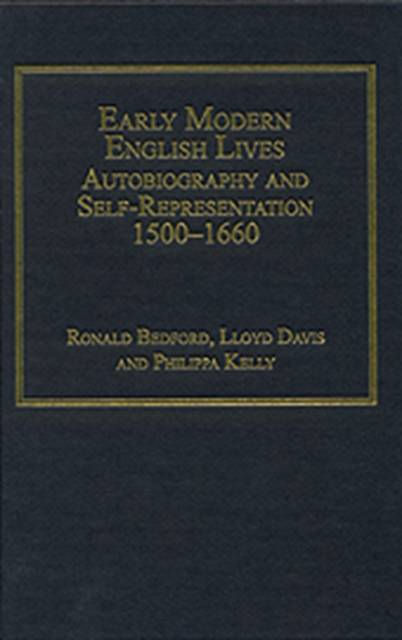
- Afhalen na 1 uur in een winkel met voorraad
- Gratis thuislevering in België vanaf € 30
- Ruim aanbod met 7 miljoen producten
- Afhalen na 1 uur in een winkel met voorraad
- Gratis thuislevering in België vanaf € 30
- Ruim aanbod met 7 miljoen producten
Zoeken
Early Modern English Lives
Autobiography and Self-Representation 1500-1660
Ronald Bedford, Lloyd Davis, Philippa Kelly
Hardcover | Engels
€ 202,95
+ 405 punten
Uitvoering
Omschrijving
How did early modern English people write about themselves, and how do we listen to their voices four centuries later? The authors of Early Modern English Lives: Autobiography and Self-Representation 1500-1660 argue that identity is depicted through complex, subtle, and often contradictory social interactions and literary forms. Diaries, letters, daily spiritual reckonings, household journals, travel journals, accounts of warfare, incidental meditations on the nature of time, death and self-reflection, as well as life stories themselves: these are just some of the texts that allow us to address the social and historical conditions that influenced early modern self-writing. The texts explored in Early Modern English Lives do not automatically speak to our familiar patterns of introspection and self-inquiry. Often formal, highly metaphorical and emotionally restrained, they are very different in both tone and purpose from the autobiographies that crowd bookshelves today. Does the lack of emotional description suggest that complex emotions themselves, in all the depth and variety that we now understand (and expect of) them, are a relatively modern phenomenon? This is one of the questions addressed by Early Modern English Lives. The authors bring to our attention the kinds of rhetorical and generic features of early modern self-representation that can help us to appreciate people living four hundred years ago as the complicated, composite figures they were: people whose expression of identity involved an elaborate interplay of roles and discourses, and for whom the notion of privacy itself was a wholly different phenomenon.
Specificaties
Betrokkenen
- Auteur(s):
- Uitgeverij:
Inhoud
- Aantal bladzijden:
- 249
- Taal:
- Engels
Eigenschappen
- Productcode (EAN):
- 9780754652953
- Verschijningsdatum:
- 28/07/2007
- Uitvoering:
- Hardcover
- Formaat:
- Genaaid
- Afmetingen:
- 156 mm x 233 mm
- Gewicht:
- 452 g

Alleen bij Standaard Boekhandel
+ 405 punten op je klantenkaart van Standaard Boekhandel
Beoordelingen
We publiceren alleen reviews die voldoen aan de voorwaarden voor reviews. Bekijk onze voorwaarden voor reviews.











